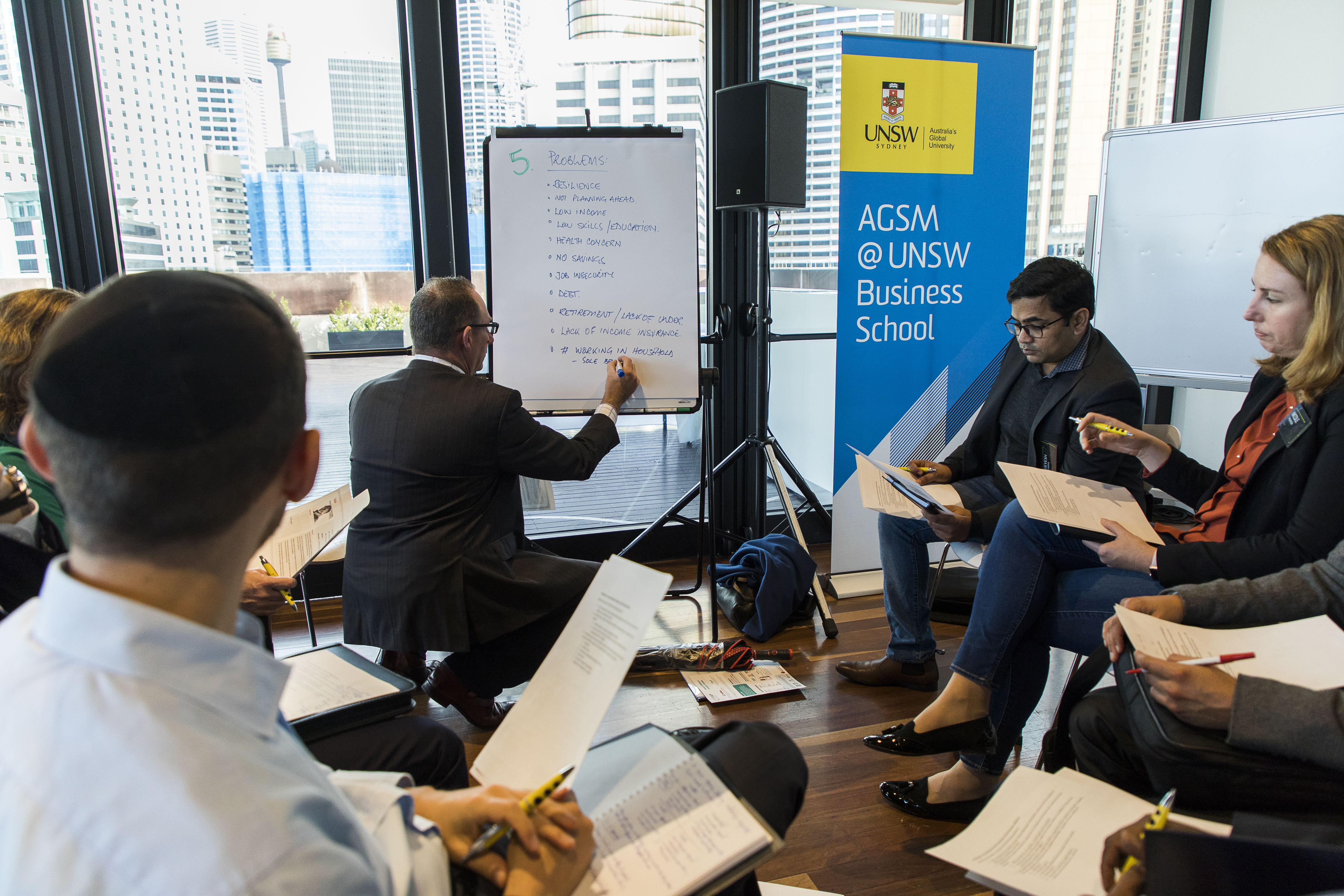Redesigning the MBA for a rapidly shifting business world
AGSM is adapting its MBA programs to better equip students with the skills and capabilities executives need in a rapidly changing world.
AGSM is adapting its MBA programs to better equip students with the skills and capabilities executives need in a rapidly changing world.

As organisations grapple with continued complex change and disruption, industry is demanding more than ever that its leaders are equipped to face these challenges with confidence.
Leaders today are expected to be adaptable and resilient with a growth mindset that equips them to see the world differently and adapt with a holistic view, rather than be transfixed by change.
By redesigning its Full-Time and Executive MBA programs, AGSM @ UNSW Business School is preparing students to contend with the realities of organisational complexity - classes are adaptive and experiential and students are immersed in active learning experiences and exposed to practical skills and tools they can immediately apply to real business problems.
According to Associate Professor Michele Roberts, AGSM Academic Director, changes to the Full-Time and Executive MBA programs reflect a demand from students and organisations for skills uplift amid drastic change.
“The pace of change in workplaces right now is truly unprecedented, and the skills we need at work have changed. The need to engage, learn and then implement ideas quickly is more dramatic than ever.”
Assessing this need has influenced AGSM’s decision to make MBA programs quicker, more flexible and more focused on disruption. The Full-Time MBA can now be completed in 12 months allowing students to apply what they have learned in their roles. “This allows MBA students to complete a top-ranked program, at a speed that reflects the level of workplace change we’re currently experiencing. It’s enabling people to get back in the workforce sooner, well equipped to lead in our disrupted world,” she says.
According to the latest Graduate Management Admissions Council’s (GMAC) Prospective Students Survey 2019, Australians were just over twice as likely to choose a one-year MBA over a two-year program (26% vs 11%), so this change will cater well to the needs of the local market. In addition, the survey indicated that women are more attracted to shorter programs, with 32% of women saying they would consider a longer program compared to 49% of men.
To make a shorter program possible, electives have been reduced from seven to four, while the MBA Extension is still available for those who want to extend their MBA experience to a two-year program.
“With the addition of an embedded Responsible Management curriculum, the new MBA programs will prepare students for an ever-transforming world of work and get them ready to accelerate through their careers and make a meaningful impact as they grow as leaders.”
Upskilling for the future of work
The updated curriculum features a focus on both competencies, skills and knowledge and complementary soft skills to improve the overall educational experience and strengthen career outcomes for students. Skills such as data science and AI, blockchain, process automation and VR are crucial for driving businesses forward and achieving transformation but they must be complemented with soft skills – or the ability to apply them in a workplace context
“Soft skills, or interpersonal skills, include the ability to lead and build culture in distributed workforces, to communicate when you can't have your employees in the same room on a Monday morning. But there’s also the increased need to lead and build culture in a contingent workforce,” Roberts says.
“Adaptive leadership, having an innovator’s mindset rather than an incumbent mindset, the ability to communicate effectively to lead effectively – these are the skills that are critical in a complex and rapidly evolving environment.”
The Part-Time MBA (Executive) also has new courses in Growth & Innovation, Disruption & Transformation and Leadership Immersion.
Global problems require a global education
These changes also make AGSM the only top-ranked MBA program that includes an international exchange opportunity for students within their 12 month program. Roberts says that now more than ever, having an international MBA experience couldn’t be more critical.
“None of the world’s most important problems – climate change, the threat of AI and technological job disruption, the global pandemic – can be solved in isolation,” she says.
“These things that threaten everything that is important to us will only be overcome with global solutions. So to put yourself in another country, and see these issues from a different perspective, is crucial to having a well-rounded MBA education.”
With exchange partners including Wharton, Yale, Kellogg School of Management, Chicago Booth and London Business School, the redesigned AGSM MBA enables students to create truly international networks and to become global leaders with a global mindset.
“To be able to study in Australia, the gateway to Asia, and then go across to the US or Europe for a third of your degree, all within 12 months, is something unique that AGSM offers,” Roberts says.
The start date for the Full-Time MBA program has also shifted from a January start date to May, which makes entry easier for many international students.
“To be in a program that brings leaders from all over the world, from many different countries as we do, means you get to sit in a room with brilliant leaders from diverse cultural backgrounds and understand the consensus. You come to understand what it takes to scale up and implement solutions on an international scale.”
To learn more about AGSM’s globally-ranked Full-Time MBA program, click here.
To learn more about AGSM’s globally-ranked MBA (Executive) program, click here.
To find out more about AGSM @ UNSW Business School, click here.